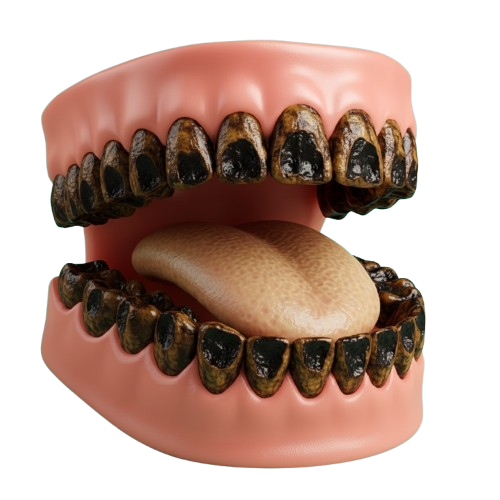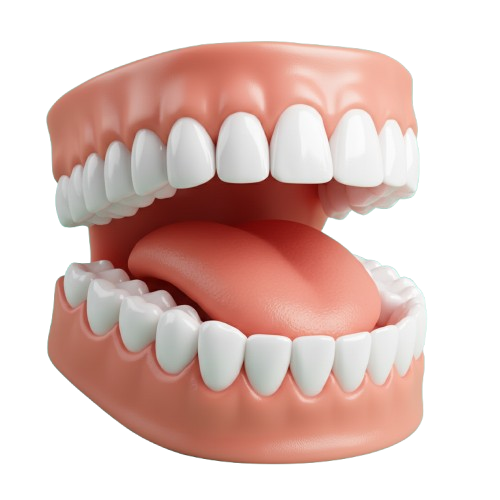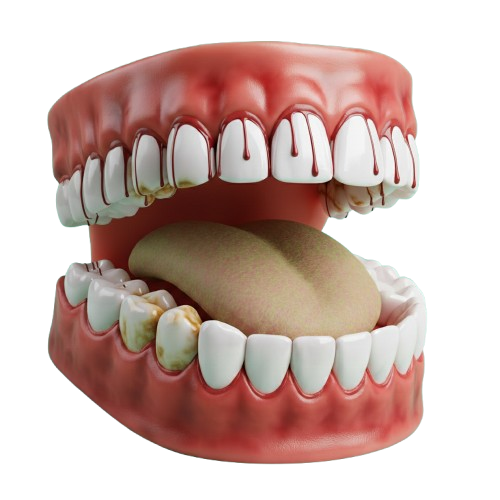- Amman, King Hussain Park, Jordan
- +(962) 000-0000
- info@curafile.com
Mouth and Teeth
- Home
- Mouth and Teeth
Your teeth are made of a hard, bonelike material. There are four parts: Enamel, your tooth's hard surface Dentin, the hard yellow part under the enamel Cementum, the hard tissue that covers the root and keeps your teeth in place Pulp, the soft connective tissue in the center of your tooth. It contains nerves and blood vessels. You need your teeth for many activities that you may take for granted. These include eating, speaking and even smiling.

How Dental Health affect Other Parts of your Body


Can Bad Teeth Cause Heart Problems?
Oral health and heart disease are connected by the spread of bacteria – and other germs – from your mouth to other parts of your body through the bloodstream. When these bacteria reach the heart, they can attach themselves to any damaged area and cause inflammation. According to Mayo Clinic, this can result in illnesses such as endocarditis, an infection of the inner lining of the heart. According to the American Heart Association, other cardiovascular conditions such as atherosclerosis (clogged arteries) and stroke have also been linked to inflammation caused by oral bacteria.
Who Is at Risk?
Patients with chronic gum conditions such as gingivitis or advanced periodontal disease have the highest risk for heart disease caused by poor oral health, particularly if it remains undiagnosed and unmanaged. The bacteria associated with gum infection are in the mouth and can enter the bloodstream, where they attach to the blood vessels and increase your risk for cardiovascular disease. Even if you don't have noticeable gum inflammation, however, inadequate oral hygiene and accumulated plaque, also known as biofilm, put you at risk for gum disease. The bacteria can also migrate into your bloodstream, causing elevated C-reactive protein, a marker for inflammation in the blood vessels. This can increase your risk of heart disease and stroke, according to the Cleveland Clinic.
Symptoms and Warning Signs
According to the American Academy of Periodontology (AAP), you may have gum disease, even if it's in its early stages, if:
- Your gums are red, swollen, and sore to the touch.
- Your gums bleed when you eat, brush or floss.
- You see pus or other signs of infection around the gums and teeth.
- Your gums look as if they are "pulling away" from the teeth.
- You frequently have bad breath or notice a bad taste in your mouth.
- Or some of your teeth are loose or feel as if they are moving away from the other teeth.
Prevention Measures
Good oral hygiene and regular dental examinations are the best way to protect yourself against gum disease development. The American Dental Association (ADA) Mouth Healthy site recommends brushing your teeth twice a day with a soft-bristled brush that perfectly fits your mouth, so it reaches every tooth surface adequately. The ADA also suggests that you use an ADA-accepted toothpaste, which is proven to increase gum health in four weeks. You should also floss daily and visit your dental hygienist for regular professional cleanings.
By being proactive about your oral health, you can protect yourself from developing a connection between oral health and heart disease and keep your smile healthy, clean, and beautiful throughout your life.
Oral Care Center articles are reviewed by an oral health medical professional. This information is for educational purposes only. This content is not intended to be a substitute for professional medical advice, diagnosis or treatment. Always seek the advice of your dentist, physician or other qualified healthcare provider.
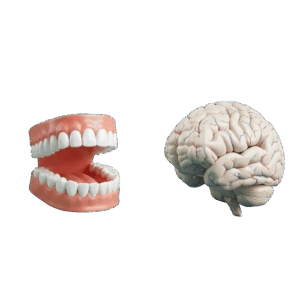
Your mouth is more connected to your brain than you might think. Keeping your teeth and gums healthy doesn’t just give you a nice smile — it also helps protect your memory, focus, and overall brain health.
1. Reduces Inflammation That Can Harm the Brain
Gum disease (periodontitis) causes ongoing inflammation in the body. This inflammation doesn’t stay in the mouth — it can spread through the bloodstream and reach the brain.
Good oral hygiene lowers gum inflammation.
Less inflammation means a lower risk of memory problems and neurodegenerative diseases such as Alzheimer’s.
2. Prevents Harmful Bacteria from Reaching the Brain
When gums bleed or become infected, bacteria can enter the bloodstream and even reach brain tissue. Some studies found traces of Porphyromonas gingivalis (a gum disease bacteria) in the brains of people with Alzheimer’s disease.
Brushing and flossing daily helps keep these bacteria under control.
Healthy gums act as a protective barrier that keeps infection away from the brain.
3. Supports Better Blood Flow and Oxygen to the Brain
Healthy teeth and gums support strong cardiovascular health. Since your brain relies on steady blood flow to deliver oxygen and nutrients, good oral health indirectly helps maintain healthy brain circulation and function.
4. Boosts Mood and Cognitive Function
Oral pain, infection, or missing teeth can lead to chronic stress, poor sleep, and difficulty eating healthy foods — all of which affect brain performance.
By keeping your mouth healthy, you support:
Better nutrition
Lower stress
More stable mood and focus
In Summary
A healthy mouth supports a healthy mind.
By brushing, flossing, and visiting your dentist regularly, you reduce inflammation, prevent bacterial spread, and keep your brain strong and sharp for years to come.
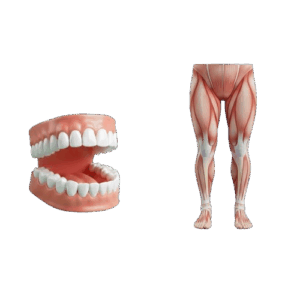
Your mouth and lungs are closely connected — everything that passes through your mouth, including bacteria, can reach your respiratory system. Maintaining good oral hygiene doesn’t just protect your teeth and gums — it also helps keep your lungs strong and healthy.
1. Prevents Bacteria from Reaching the Lungs
The mouth naturally contains many types of bacteria. If you have gum disease or tooth infections, harmful bacteria can easily be inhaled into the lungs.
This can lead to or worsen:
Pneumonia
Bronchitis
Chronic Obstructive Pulmonary Disease (COPD)
By brushing, flossing, and having regular dental checkups, you reduce these bacteria and protect your lungs from infection.
2. Reduces Inflammation in the Airways
Oral inflammation doesn’t stay isolated. Bacteria and toxins from gum disease can trigger systemic inflammation, affecting other organs — especially the lungs.
Healthy gums help keep the immune system balanced, lowering the risk of:
Lung tissue inflammation
Worsening symptoms in conditions like asthma or COPD
3. Helps You Breathe Easier
People with gum disease often experience chronic inflammation, which can make breathing problems worse. Good oral hygiene supports clearer airways and more comfortable breathing — especially important for older adults or those with lung conditions.
4. Supports the Body’s Natural Defense System
A clean and healthy mouth means fewer germs enter your respiratory system. Your saliva and mucous membranes are part of your body’s first line of defense.
Keeping them healthy through good oral care helps your lungs stay clean and resilient against infections.
In Summary
Healthy teeth and gums mean healthier lungs.
By taking care of your mouth every day, you reduce harmful bacteria, prevent respiratory infections, and help your body breathe better and live longer.
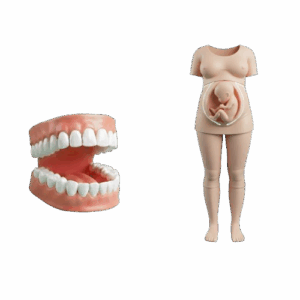
During pregnancy, a woman’s body goes through major hormonal changes that can affect the gums and teeth. Taking care of your oral health during this time isn’t just about keeping a bright smile — it’s an essential part of protecting both mother and baby’s health.
1. Reduces the Risk of Premature Birth and Low Birth Weight
Research has shown that gum disease (periodontitis) is linked to premature delivery and low birth weight.
Here’s why:
Bacteria from infected gums can enter the bloodstream.
These bacteria may trigger inflammatory responses that affect the uterus and placenta.
Good oral hygiene and regular dental checkups during pregnancy help lower inflammation and reduce these risks.
2. Helps Control Pregnancy Gingivitis
Many women experience pregnancy gingivitis, a common gum irritation caused by hormonal changes.
Symptoms include:
Swollen, red, or bleeding gums
Bad breath or tenderness
By brushing, flossing, and visiting the dentist, you can keep this under control and prevent it from developing into more serious gum disease.
3. Supports Better Nutrition and Comfort
Healthy teeth and gums make it easier to eat a balanced diet, which is crucial for your baby’s growth and development.
Oral pain or infections can make it difficult to eat well, leading to nutritional deficiencies that may affect both mother and baby.
4. Lowers Bacterial Transmission to the Baby
Mothers with untreated tooth decay or gum infections can pass bacteria to their newborns through saliva (for example, by kissing or sharing utensils).
Healthy oral habits help reduce harmful bacteria, giving your baby a healthier start in life.
In Summary
Good oral health supports a safe and healthy pregnancy.
By maintaining daily brushing, flossing, and professional cleanings, you protect yourself and your baby from infection, inflammation, and complications — helping ensure a healthier pregnancy and delivery.

Mental Well-being

Nutrition & Fitness

Preventive Care
-
Find a clinic near you
-
Call for an appointment!
-
Feel free to message us!
About Us
Curafile is the biggest Healthcare Curated Network Globally that serves citizens, service providers in B2C and B2B directions.
- Al Hussain Business Park
Amman, Jordan
Additional Links
- test October 20, 2025
- Hello world! October 7, 2025
- Many doctors use wrong test to diagnose kids food allergies February 12, 2017
- Rising cost of diabetes care concerns patients and doctors January 15, 2017
- Can breakfast help keep us thin? Nutrition science is tricky January 5, 2017
